Ecuador’s presidential election could boost Chavez influence in Latin America
Nationalistic Rafaela Correa leads polls ahead of Sunday vote, but second round looks inevitable.

A nationalistic ally of Venezuelan President Hugo Chavez leads Ecuadorian presidential race ahead of Sunday vote, but a runoff with either a Social democratic candidate or a banana tycoon is expected, according to last opinion polls published by the local media this week.
Rafael Correa, who is a former Minister of Economy in the administration of the outgoing president Alfredo Palacio, has investors worried over his plans to renegotiate Ecuador's $10 billion foreign debt if finally elected President next Sunday. Polls show Correa near to securing a first round victory on October 15 with 30% of the votes, but many voters are still undecided. Rivals, center-leftist Leon Roldos and banana magnate Alvaro Noboa are tussling for second place to force a run-off in late November.
Correa has promised to “break the grip of Ecuador’s political elite”, an anti-establishment message to appeal to millions of Ecuadorians disappointed by decades of poverty an political instability. The nationalistic leader has insisted in renegotiating current contracts with foreign oil companies operating in the country.
Correa’s political platform resembles that of Hugo Chavez when he was first elected President of Venezuela in 1999. "They (the political elite) realize the party is over, they know the privileges of the political mafia are finished," Correa, a former economy minister, told local television this week.
Correa positions himself as an outsider to obtain the support of those who are highly disappointed with traditional parties. But he could struggle in any second round run-off as traditional parties join ranks to keep him from trying to curb their influence. According to local observers, a second round could favor moderate Roldos more than Noboa, a billionaire populist seen as a representative of the political old guard.
However, many Ecuadorians are also reluctant to vote for an outsider, as they did in 2003, when former army trooper Lucio Gutierrez was elected President. Gutierrez, at that time the champion of the poor masses, was supported by the powerful indigenous party Pachakutik but quickly lost support as promoted the same pro-market policies that had fuelled his traditional predecessors.
Gutierrez was finally sacked by a popular rebellion last year after middle-class protesters armed just with radio broadcasts, mobile phones and email messages managed to mobilize protests that pressured Congress to remove him for abusing his power. Incumbent President Alfredo Palacio is leading a precarious transition since then.
Sunday presidential election is the new opportunity Ecuadorians have to restore stability in a country shook by a decade of political turmoil. In less than ten years, three democratically elected presidents were sacked by popular rebellions of disillusioned citizens.
If no candidate wins more than 50 percent of the vote, or at least 40 percent with a 10 percentage point advantage over his nearest rival, then a run-off between the two top candidates will be held on November 26.
Hernan Etchaleco
Pravda.ru
Subscribe to Pravda.Ru Telegram channel, Facebook, RSS!




